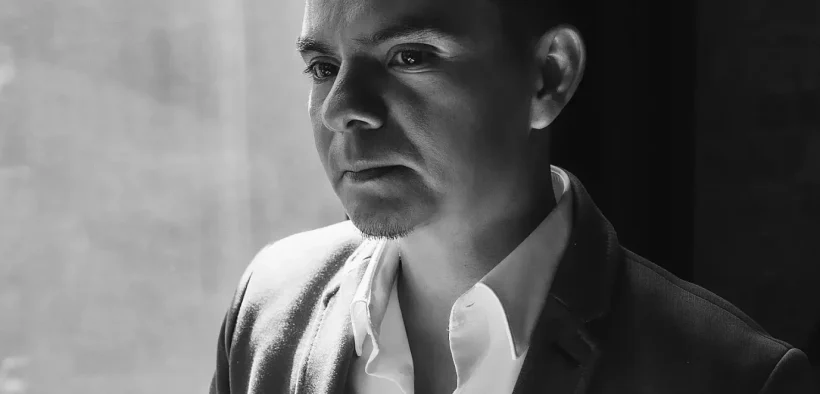Dr. Alex E. Chávez: The Afterlives of Sound
Share

On Tuesday evening, March 25th, a handful of students and professors gathered in an Olin classroom to hear the Anthropologist and musical artist Dr. Alex E. Chávez speak. Part of the Borderlands Symposium Latinos Unidos and the Latin American & Border Studies program organized the event. Dr. Chávez is a very successful and accomplished individual, currently acting as an Associate Professor of Anthropology at the University of Notre Dame. He’s written many published essays, a multi-award winning book titled Sounds of Crossing: Music, Migration, and the Aural Poetics of Huapango Arribeño, and a phenomenal debut album titled “Sonorous Present”.
Titled “The Afterlives of Sound: Memory, Ethnography, and the Borderlands”, Dr. Chávez’s lecture provided incredible insight into his anthropological research on the sound of the Borderlands. He began by playing a clip of a song from a traditional festival in Mexico, which included the instrumentals of a fiddle and a guitar. As it came to an end he began narrating from his published book, describing an ethereal scene in January at around one in the morning, embracing his senses within a sea of dancers and celebration.
The audience learned that the song clip inspired Dr. Chávez to write his recently released album, “Sonorous Present”, based also on his book Sounds of Crossing. He described how sound is heard through cultural forms of listening, which stimulates an auditory imagining. He stated, “when we tune in, we rationalize,” and discussed the connection between modes of attention in accordance with rationality. “Tuning in” is a mode of attention legitimized through sound, and acted out through rationality.
Discussing the border, Dr. Chávez dove into the ‘art’ of it. Calling it a necessary trajectory, he said that “crossing the threshold of the border exceeds space” providing a desire to move, to reunite, to make a living, and a desire to go so that a return can come into being. He emphasized a “crossing”, and asked the preliminary question of his research: What does this crossing sound like? The answer lies in the music of his album. Dr. Chávez took the clip he presented at the beginning of the talk and transformed it into his own composition, tuning the instruments a bit more and adding beautiful vocals to top it. He calls it ethnographic songwriting.
Dr. Chávez shared his viewpoint on songwriting, his perception of art: “Art can intervene across borders […] it bears witness [and it] takes up the call to elevate the seemingly ordinary.” Dr. Chávez sees his media as healing, and a way to grapple with grief, in order to process the world around him. He said, “These compositions for me, they broke my heart. I think often, it is okay to dwell on heartache.” Sharing his personal, lived experience, he went on: “Most of my immediate family is now all dead—but they lived. They survived the border and the crossing. Those stories have become a part of me.”
Through a powerful testimony of music, research, and reflection, Dr. Chávez wrote, recorded, and released his album “Sonorous Present”. It is a piece that refuses to move on, asks the audience to stay put, and be still in the space they are in. It is a work of art created from necessity. He called the album “past, present, and future oriented,” and “a sonic mourning in a bordered world.” Stream his moving album on any platform, and use his story as inspiration to build a future from your past—acknowledging borders that needed to be crossed.
